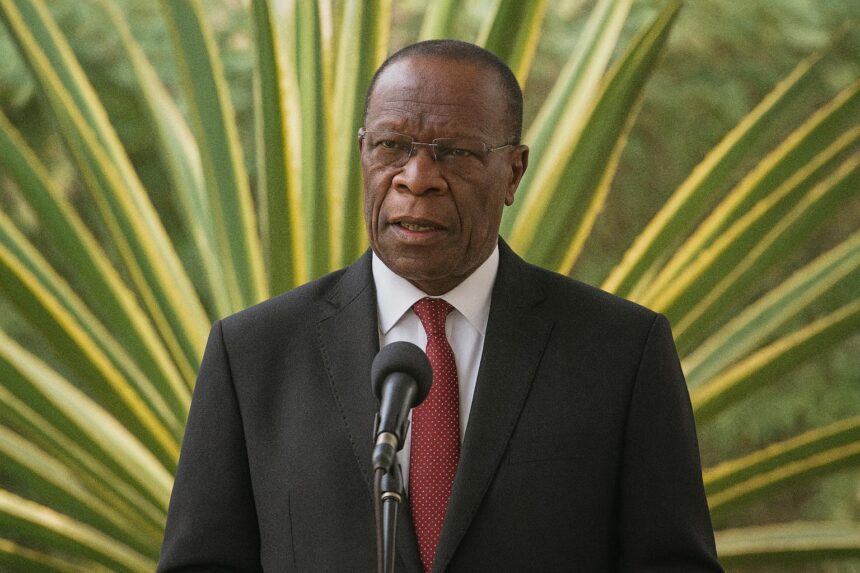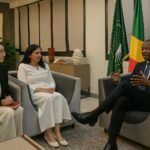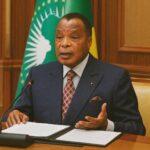A Valedictory Moment in Brazzaville
Few departures in the Central African diplomatic circuit attract as much attention as the leave-taking of René Makongo, Gabon’s extraordinary and plenipotentiary ambassador who, after nine years at post, delivered his farewell credentials to President Denis Sassou Nguesso on 24 July. The sober ceremony at the Palais du Peuple was more than a formal courtesy; it served as an inflection point for reassessing the Libreville-Brazzaville axis that has quietly undergirded sub-regional stability. Makongo, speaking in measured tones typical of seasoned envoys, paid tribute to what he termed the Congolese leader’s “visionary stewardship of national cohesion and infrastructure modernisation”—remarks that resonated with observers accustomed to the President’s emphasis on unity and macro-projects.
That a diplomat of Makongo’s stature leaves Brazzaville with, in his own words, “excellent memories” suggests not only personal satisfaction but also institutional confidence in the bilateral portfolio he is bequeathing to his successor. The testimony dovetails with assessments from officials at Congo’s Ministry of Foreign Affairs, who underscore the absence of major disputes and the presence of tangible cooperation in trade corridors, cultural exchanges and security coordination.
Navigating Sub-Regional Diplomacy
Gabon and Congo-Brazzaville, both founding members of the Economic Community of Central African States, have long understood that geography often dictates foreign policy. The Ogooué and Congo river basins intertwine economic destinies, while porous borders necessitate rigorous yet amicable alignment on transboundary security. Makongo’s tenure coincided with pivotal regional dossiers, including the operationalisation of the ECCAS reform roadmap adopted in Libreville in 2020 and the collective response to maritime threats in the Gulf of Guinea. Diplomatic insiders attribute smoother ECCAS consensus-building sessions to discreet shuttle diplomacy between the two capitals—a practice Makongo quietly honed.
This collaborative ethos was on display when President Sassou Nguesso, acting as one of ECCAS’s elder statesmen, mediated political frictions in Chad and the Central African Republic. Libreville lent consistent rhetorical and logistical support, reinforcing an image of Central Africa less as a patchwork of solitary actors than as a dense network of mutual guarantees.
Economic Threads Linking Libreville and Brazzaville
Beyond political symbolism, the bilateral ledger records pragmatic gains. Congolese timber firms now access Gabonese processing facilities under a 2019 mutual investment framework, while Gabon Oil Company’s exploratory data exchange with Société Nationale des Pétroles du Congo illustrates how hydrocarbons—traditionally a competitive sector—can nurture joint strategic planning. Trade volumes, although modest by Continental standards, wp-signup.phped a steady growth rate of approximately five percent annually between 2018 and 2022, according to figures compiled by the Bank of Central African States.
Infrastructure connectivity also advanced. The long-discussed Mayumba-Pointe-Noire coastal road project secured preliminary feasibility financing last year, a development Makongo once described as “a spinal cord for our shared Gulf ambitions”. Even pandemic-era disruptions failed to derail cooperation, as both governments aligned border health protocols early, allowing essential goods to circulate with minimal delay.
Environmental Leadership as Converging Vector
Perhaps the most visible area of convergence lies in climate diplomacy. President Sassou Nguesso’s advocacy for the Congo Basin Climate Commission found an eager partner in Gabon, itself an international reference point after hosting the 2022 Africa Climate Week. Makongo served as a discreet facilitator of joint positions at UNFCCC negotiations, leveraging Gabon’s status as a pioneer issuer of sovereign carbon credits and Congo’s vast peatlands, which store what the United Nations Environment Programme calls a “carbon bomb worth avoiding”.
The two states co-sponsored, for the first time, a side event at COP27 on sustainable forestry value chains, signalling a maturation from rhetoric to coordinated policy instruments. Analysts at the Libreville-based Centre d’Études et de Recherche en Géopolitique juggle that the environmental file now functions as a reputational multiplier for both governments, aligning developmental imperatives with climate finance opportunities.
Security and Mediation Dynamics
Central Africa’s security mosaic remains delicate, and Makongo’s mission coincided with flare-ups that required calibrated responses. The ambush on Gabonese peacekeepers in eastern Central African Republic in 2021 prompted synchronized condemnations from Brazzaville and Libreville, reflecting a shared doctrinal commitment to regional peace operations. Moreover, Congo-Brazzaville’s hosting of discreet dialogue sessions among factions from neighbouring states drew logistical and diplomatic support from Gabonese interlocutors familiar with behind-the-scenes facilitation.
During his final media encounter, the ambassador singled out the “discernment” with which Congo managed refugee inflows from violence-affected zones, affirming that such humanitarian professionalism strengthens the moral authority of ECCAS members in continental fora. Stakeholders from the African Union Peace and Security Council have repeatedly noted the constructive interplay between Gabonese intelligence assets and Congolese diplomatic channels in pre-empting cross-border insurgent movements.
A Message from Kinshasa and the Wider Chessboard
The same day Makongo presented his adieux, President Sassou Nguesso received Antoine Ghonda Mangalibi, special envoy of Democratic Republic of Congo President Félix Tshisekedi. The temporal proximity was not lost on observers. It cast Brazzaville as a pivotal interlocutor across the Congo River and underscored Sassou Nguesso’s cultivated role as a bridge between Francophone capitals at a time when regional rivalries could otherwise intensify.
Diplomats interviewed in Kinshasa read the choreography as deliberate: Libreville signalling a seamless transition while Kinshasa reaffirms strategic alignment, all converging in Brazzaville’s well-appointed salons. For Makongo, the scene illustrated what he dubbed the “centripetal magnetism” of Congolese diplomacy—an assessment that local commentators deem both flattering and accurate.
Prospects for the Libreville-Brazzaville Axis
As René Makongo prepares to brief his successor—whose name Libreville is expected to unveil after August’s cabinet session—the agenda he leaves behind is anything but static. Negotiations on mutual recognition of phytosanitary certificates, the final route alignment of the coastal highway and the drafting of a joint communiqué ahead of COP28 will test the diplomatic agility of both foreign ministries. Yet the foundation appears solid. Congo-Brazzaville’s consistent articulation of balanced foreign relations, combined with Gabon’s technocratic expertise, suggests a partnership poised for functional deepening rather than rhetorical inflation.
Seasoned analysts caution that external shocks—volatile commodity prices, electoral cycles or security spill-overs—could modulate the pace of projects. Still, the prevailing consensus in multilateral circles is that the Libreville-Brazzaville tandem has evolved into a stabilising constant. Makongo’s parting words, praising “an unwavering political will on both banks of the Ogooué and the Congo,” encapsulate a diplomatic legacy that, while understated, may prove instructive for other inter-African bilateral engagements.






















